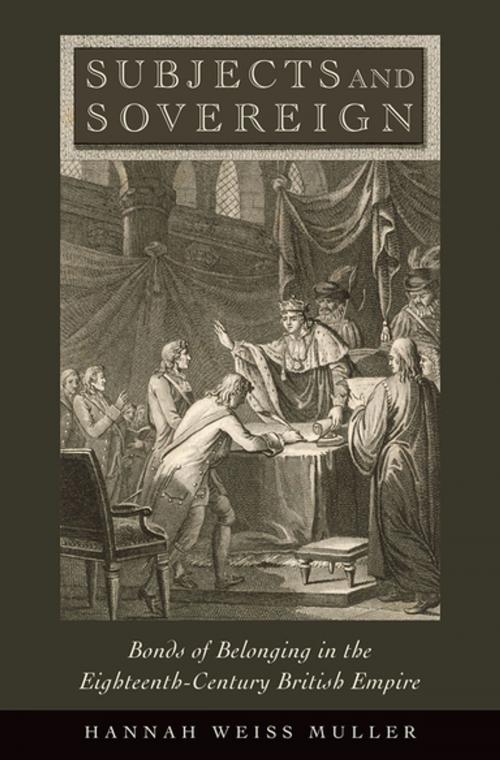Subjects and Sovereign
Bonds of Belonging in the Eighteenth-Century British Empire
Nonfiction, Social & Cultural Studies, Political Science, Politics, History & Theory, History, British| Author: | Hannah Weiss Muller | ISBN: | 9780190465834 |
| Publisher: | Oxford University Press | Publication: | June 30, 2017 |
| Imprint: | Oxford University Press | Language: | English |
| Author: | Hannah Weiss Muller |
| ISBN: | 9780190465834 |
| Publisher: | Oxford University Press |
| Publication: | June 30, 2017 |
| Imprint: | Oxford University Press |
| Language: | English |
In the aftermath of the Seven Years' War, when a variety of conquered and ceded territories became part of an expanding British Empire, crucial struggles emerged about what it meant to be a "British subject." Individuals in Grenada, Quebec, Minorca, Gibraltar, and Bengal debated the meanings and rights of subjecthood, with many capitalizing on legal ambiguities and local exigencies to secure access to political and economic benefits. Inhabitants and colonial administrators transformed subjecthood into a shared language, practice, and opportunity as individuals proclaimed their allegiance to the crown and laid claim to a corresponding set of protections. Approaching subjecthood as a protean and porous concept, rather than an immutable legal status, Subjects and Sovereign demonstrates that it was precisely subjecthood's fluidity and imprecision that rendered it so useful to a remarkably diverse group of individuals. In this book, Hannah Weiss Muller reexamines the traditional bond between subjects and sovereign and argues that this relationship endured as a powerful site for claims-making throughout the eighteenth century. Muller analyzes both legal understandings of subjecthood, as well as the popular tradition of declaring rights, in order to demonstrate why subjects believed they were entitled to make requests of their sovereign. She reconsiders narratives of upheaval during the Age of Revolution and insists on the relevance and utility of existing structures of state and sovereign. Emphasizing the stories of subjects who successfully leveraged their loyalty and negotiated their status, she also explores how and why subjecthood remained an organizing and contested principle of the eighteenth-century British Empire. By placing the relationship between subjects and sovereign at the heart of her analysis, Muller offers a new perspective on a familiar period and suggests that imperial integration was as much about flexible and expansive conceptions of belonging as it was about shared economic, political, and intellectual networks.
In the aftermath of the Seven Years' War, when a variety of conquered and ceded territories became part of an expanding British Empire, crucial struggles emerged about what it meant to be a "British subject." Individuals in Grenada, Quebec, Minorca, Gibraltar, and Bengal debated the meanings and rights of subjecthood, with many capitalizing on legal ambiguities and local exigencies to secure access to political and economic benefits. Inhabitants and colonial administrators transformed subjecthood into a shared language, practice, and opportunity as individuals proclaimed their allegiance to the crown and laid claim to a corresponding set of protections. Approaching subjecthood as a protean and porous concept, rather than an immutable legal status, Subjects and Sovereign demonstrates that it was precisely subjecthood's fluidity and imprecision that rendered it so useful to a remarkably diverse group of individuals. In this book, Hannah Weiss Muller reexamines the traditional bond between subjects and sovereign and argues that this relationship endured as a powerful site for claims-making throughout the eighteenth century. Muller analyzes both legal understandings of subjecthood, as well as the popular tradition of declaring rights, in order to demonstrate why subjects believed they were entitled to make requests of their sovereign. She reconsiders narratives of upheaval during the Age of Revolution and insists on the relevance and utility of existing structures of state and sovereign. Emphasizing the stories of subjects who successfully leveraged their loyalty and negotiated their status, she also explores how and why subjecthood remained an organizing and contested principle of the eighteenth-century British Empire. By placing the relationship between subjects and sovereign at the heart of her analysis, Muller offers a new perspective on a familiar period and suggests that imperial integration was as much about flexible and expansive conceptions of belonging as it was about shared economic, political, and intellectual networks.















